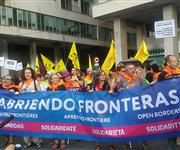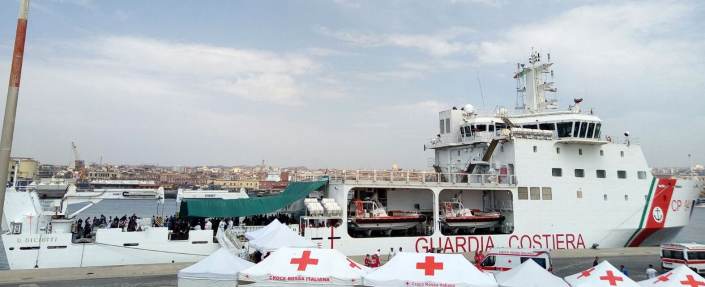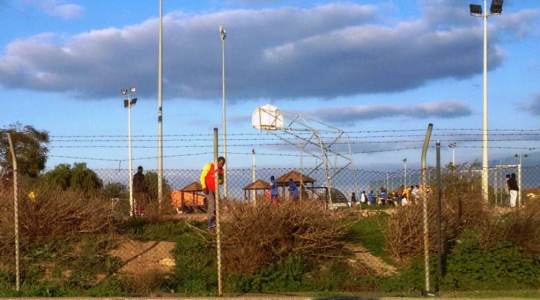The Mineo Business. The affairs of the concentration camp
Closed,
isolated and enormous: this is the first impression that the Mineo
Concentration Camp, the Centre which Berlusconi and Maroni
have been so proud of, creates. Yet it is also big business: cooperatives and
consortiums who are playing for millions and millions of euro and thousands and
thousands of votes…..
“The
Mineo Centre in the Province
of Catania is set up as a
sort of non-place where people carry out their daily lives in conditions of
apathy and resignation. The very idea of being able to manage a macro-
structure where thousands of people are segregated is an irrational project
that can only lead to social distress.”
Fulvio Vassallo, a legal practitioner from the University
of Palermo one of Italy’s leading experts on
Political Migration, is convince of this statement. In the Berlusconi-Maroni
grand plans, what was intended as a centre of excellence to take in asylum
seekers fleeing wars in Africa and the Middle East,
is instead the most representative example of a xenophobic culture and reveals
the openly discriminatory nature of the nation’s ruling classes. The ex- US
military residential zone for the families at the Sigonella base which has now
been converted into a “luxury” concentration camp for migrants, has
made the lives of thousands of people invisible, cancelling out both their
suffering and their hope. Mineo is first and foremost an experimental
laboratory for the new practices of deportation and incarceration of the
“others” and of those who are “different”. Yet it is also
an instrument to affirm the Emergency Migrant Model Ltd, a multi- million euro
business for the main consortiums of “social” cooperatives,
regardless of their political orientation, in southern Italy.
A recent
inquiry into the national asylum system carried out by the ASGI (Associazione
Studi Giuridici Immigrazione), in collaboration with CeSPI, Caritas and the
Consorzio Communitas denounces the centre at Mineo: “For reasons connected
to its location and for the fact of introducing a large group of foreigners
into an already fragile social-economic environment, Mineo is a structure which
is at high risk of regressing towards a ghetto. It is completely isolated from
the outside world which can easily produce serious phenomena of marginality and
social degredation.” The running of the centre, which up until last summer
was entrusted to the Italian Red Cross (through a private agreement), was based
“solely and exclusively [on] emergency” without a structured or
systematic activation of the standards on the arrival of refugees into the
country as outlined by the law. “Due to its particular isolation and
extreme size, Mineo seems to have developed, more than any of the other
centres, into a place which is suspended and indefinite and always potentially
explosive,” comments Paola Ottaviano, a lawyer from the AGSI. There have
been dramatic calls for help from the residents of the Centre, “It is not
possible to live with dignity in the centre,” says the Nigerian John W,
” the food is really bad, we have difficulty communicating with the legal
teams, there is a lack of cultural mediators and it is impossible to get to the
nearest town , which is about 10km away. Many of us have been the victims of
maltreatment and racist insults from the police and some of those who run the
centre. They often call us ‘black monkeys’.”
Desperation
and anger are the most widespread emotions. At the end of June, a team from
Medicins Sans Frontiere denounced the fact that there had already been seven
cases of attempted suicide at Mineo. “The asylum seekers are constantly
showing greater signs of depression, isolation, solitude and confusion,”
the doctors said, “The sensation of abandonment is increasing also due to
the fact that time taken to carry out bureaucratic procedures for international
protection is dilated and disproportionate. There are some who wait ridiculous
amounts of time to see the territorial commission to have their application
evaluated.” Spontaneous protests often break out and on varying occasions
road blocks have been put in place.
The
authorities were made to speed up the hearings (up to 10 a day), but according to
the Catania Anti- Racist Network, which provides the migrants with legal and political
support, the situation, “is still confused. Interpreters aren’t well
enough prepared or aware of the seriousness of the problems they are dealing
with and the commissions relentlessly proceed with their high number of rejections.”
The amount of military presence the centre is subjected to is stifling. Police,
carabinieri and the army patrol the centre 24 hours a day and agents from
Frontex, the European border control agency have been given unlimited access to
the centre. As part of Operation Hermes 2011, they paraded as journalists in
order to collect personal information from the migrants. Those who genuinely
want to hear the stories of the migrants, however, have been denied access to
all Refugee Centres in Italy,
under the orders of Maroni.
Since October 18th, the
running of the CARA has switched to an association which is temporarily under
the Consortium of Cooperative Sisifo, Palermo
-which has close links to Legacoop. For €24.96 per head per day it must supply
each of the residents with meals, clothing, a personal hygiene kit and
insurance for various services: translation; socio- psychological support;
recreational, sports and culture activities; Italian lessons. An enormous
business: €1, 497, 600 a
month -which came about as the result of inviting tenders for the contract. It
seems that it was not a particularly impartial procedure, due to the fact that
it was completed in less than a fortnight during the month of August. Instead
of placing a public announcement to notify all interested parties in the tenders
for the contract, the organising body (which was the local authority of the
Province of Catania, the only case in the whole of Italy where the running of
the CARA has been entrusted to the Prefecture or the Civil Protection) only
invited certain cooperatives to place their tenders, making use of the rushed
through law of the 13th May 2011, which enabled this procedure also for public
contracts worth over a million euro.
When
tenders for the contract at Mineo were being accepted, the vice-president of
the general consorzio, Cono Galipò (the administrator of the society which had
been running 2 Detention Centres for migrants in Lampedusa for 2 years) had a
court case pending for “various counts of aggravated fraud” relating
to the period (September 2008- May 2010) in which he ran a centre for asylum
seekers in Sant’Angelo di Brolo (Messina). According to the investigators,
Galipò didn’t release migrants despite the fact they had already been granted
their permit of stay. In total, these acts generated an “illegal
profit” of €468, 280 plus IVA (VAT/tax) for Sisifo. Little seems to have
changed with the passage to CRI- Sisifo. “The food continues to cause
complaints amongst the migrants,” declares Alfonso Di Stefano from the
Anti-Racist Network, “There is an increase in army roadblocks around the
centre to confiscate items purchased outside. Transport continues to not work
and the money which they receive, 5 euro every other day, can only be spent
within the centre itself. Medical assistance remains poor, especially for
pregnant women. Legal practitioners have to wait ages before they can gain
access to the centre to help the residents with their applications for
asylum.” The association CaraMineo is also made up of the Consorzio Sol.Co
Calatino (Caltagirone) and the Rome Cooperative La Cascina (Legacoop) and Domus
Caritas. Despite the fact these organisations were invited to present their
tenders for the management contract, none of them did. Yet, nonetheless,
Sisifo, rather generously, has decided to share the “Refugee Centre”
Business with them.
The case to
include the local cooperatives (Sol. Co. Catania and the Credito Cooperative
Bank “Luigi Sturzo”, Caltagirone), particularly Sol.Co, was put
forward by the president of the AGCI (Association Generale Cooperative
Italiane), Rosario Altieri. “In renewing our support in the initiatives
undertaken at Mineo, where fit, we can assure the support of numerous social
cooperatives, close to our association operating in the province
of Catania…” states one of his
missives to the Home Affairs Minister, Maroni,
dated 14th March 2011. Even more indicative is the insistence from the
pro-associate Sol.Co from the president of the province of Catania,
Giuseppe Castiglione, regionale co-ordinator of the Pdl. A great friend of
Angelino Alfano, the politician was arrested in 1998 for fraud related
activities during an inquiry into corruption at the Garibaldi Hosptial, Catania. Sentenced to 10 months in prison with his brother in
law Giuseppe Firrarello (senator for Forza Italia) in November 2004,
Castiglione was acquitted during the appeal to “lack of evidence”.
Since then, his main political role in Catania
has been second only to his opponent Raffaele Lombardo. One of the
battlegrounds has been carrying out of favours for local cooperatives. You can
bet that with the business behind the Mineo Centre, the president of the
Province has undoubtedly taken a large number of votes from the Sicilian
Governor.
This article was published in “I Siciliani Giovani! number 0, December
2011.



